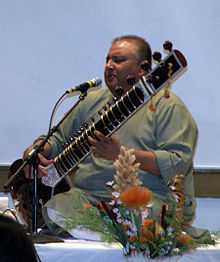Shujaat Khan
| Shujaat Husain Khan | |
|---|---|
 Shujaat Khan performing in 2011 | |
| Background information | |
| Born | 19 May 1960 |
| Genres | Hindustani classical music |
| Occupations | composer, musician |
| Instruments | sitar |
| Years active | 1972–present |
| Website | shujaatkhan.com |
Shujaat Husain Khan (born 19 May 1960) is an Indian musician and sitar player of the Imdadkhani gharana (school of music).[1] He has recorded over 60 albums and was nominated for a Grammy Award for Best World Music Album for his work with the band Ghazal with Iranian musician Kayhan Kalhor.[2] He also sings frequently. His style of sitar playing, known as gayaki ang, aims to imitate the human voice.
Early life
Born in Calcutta, Shujaat Khan is the son of legendary sitar player Ustad Vilayat Khan.[3][4] He has musical pedigree that goes back seven generations: his grandfather, Ustad Enayat Khan; his great-grandfather, Ustad Imdad Khan; and his great-great-grandfather, Ustad Sahebdad Khan - all leading artists and torchbearers of the Imdadkhani gharana with its roots in Mymensingh (present day Bangladesh). He has a brother, sitarist Hidayat Khan and sisters sufi singer, Zila Khan and Yaman Khan.
Performing career
Shujaat Husain Khan has performed at numerous music festivals in India and has traveled around the world performing in Asia, Africa, North America and Europe.
His approach to rhythm is largely intuitive, fresh and spontaneous, always astonishing his audiences. He is also known for his exceptional voice, which he uses for singing folk songs, including the album Lajo Lajo, as well as poetry, as in Hazaron Khwaishen.[5]
Shujaat Khan was featured in the concerts celebrating India's 60th anniversary of independence in 2007, and performed at the Carnegie Hall, New York,[6] Paramount Theater, Seattle, and Meyers Symphony Theater, Dallas. In a special performance, he also played at the United Nations in the Assembly Hall, Geneva.
His memorable appearances include performance at the Royal Albert Hall in London, Royce Hall in Los Angeles and Congress Hall in Berlin. In the summer of 1999, he was the featured soloist with the Edmonton Symphony Orchestra. His collaboration with different genres of music has been a very strong point as is evidenced by the enormously successful Indo-Persian venture, the Ghazal Ensemble. Their album, Rain, was nominated for a Grammy award in 2004.
In January 2000, the Boston Herald listed Shujaat Khan, along with luminaries like Seiji Ozawa and Luciano Pavarotti among the top 25 upcoming cultural events for the year.[7]
He has been invited as visiting faculty at the Dartington School of Music in England, the University of Washington in Seattle, and at UCLA.
He is also known as a fearless collaborator, lately having done wide ranging concerts with artists as diverse as Karsh Kale to a successful Jugalbandi with pioneer Hindustani vocalist Ustad Rashid Khan. One of the best remembered collaborations of the year 2009-2010 happens to be Melange. Featuring Tim Ries on the saxophone, Kevin Hays on the piano, Karsh Kale on percussion, Katayoun Goudarzi on vocals, Ustaad Shujaat Khan on sitar, Karl Peters on bass and Yogesh Samsi on tabla, Melange has toured extensively across India.
Ustad Shujaat Khan has recently tied up with Inroom Records, a Mumbai-based experimental / fusion label and artist management company, to handle his collaborative work.
Discography
Shujaat Khan has over 100 musical releases on a variety of international labels; and a video called Khandan.
References
- ↑ "Shujaat Khan’s Call Of The River released". Screenindia.com. 2008-11-14. Retrieved 2012-03-16.
- ↑ "Sitar Burst". Indian Express. 2008-09-26. Retrieved 2012-03-16.
- ↑ "The raga route: From classical to massical". The Times of India. 2009-12-26. Retrieved 2012-03-16.
- ↑ "Delbar Released!". Payvand.com. Retrieved 2012-03-16.
- ↑ Project Managed by Vipin Kumar, India Today Group (2007-06-18). "Music Today". Music Today. Retrieved 2012-03-16.
- ↑ Schweitzer, Vivien (2008-08-27). "A Master Iranian Musician Plays Cultural Ambassador". The New York Times.
- ↑ http://www.screenindia.com/old/fullstory.php?content_id=7229
External links
| Wikimedia Commons has media related to Shujaat Khan. |
|